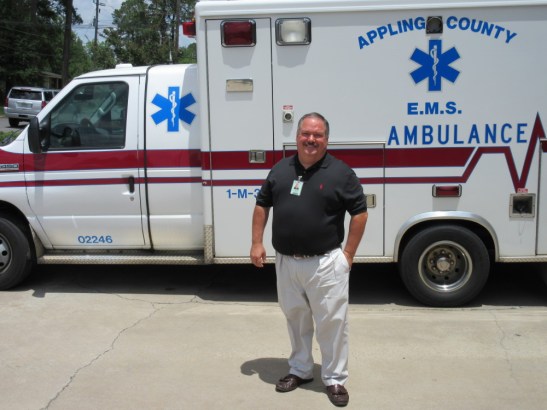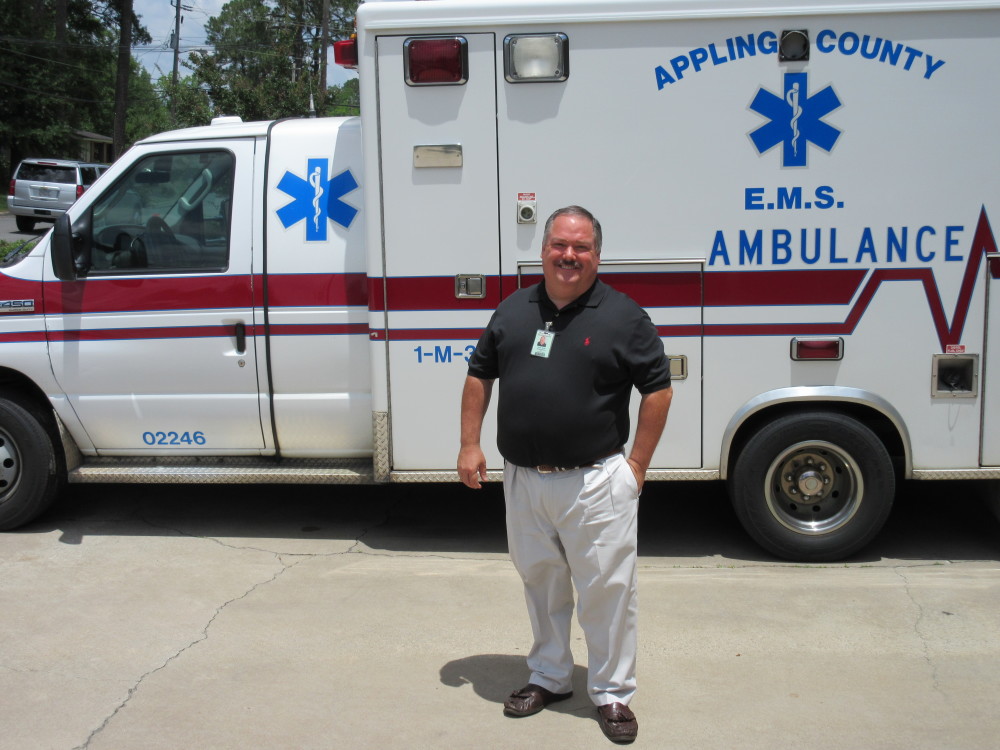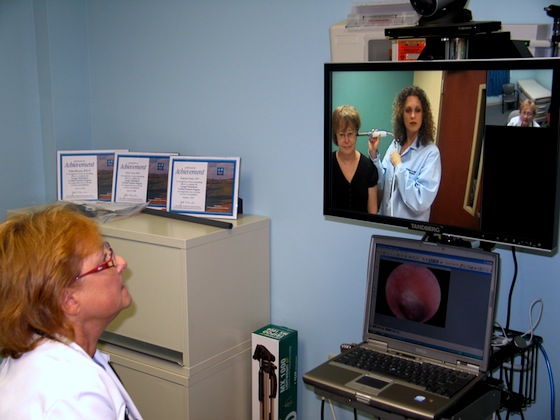
Patients such as D.C. are known in health care circles as “frequent fliers,” a term that has nothing to do with airline miles.
D.C. (his initials), 62, has been to Appling Healthcare’s emergency room in the South Georgia town of Baxley several times this year with various ailments.
He has no health insurance and no regular physician. But he does have medical problems. D.C. has had several mini-strokes, and he suffers from high blood pressure and bipolar disorder.
“He hasn’t been able to pay his [medical] bills,’’ notes his daughter, Priscilla.
D.C. and other frequent fliers in ERs are the target population for a new program in Appling County that aims to improve residents’ health, boost the local medical system and reduce unnecessary spending.
Gov. Nathan Deal’s rural hospital stabilization committee has designated Appling and three other areas in Georgia for a pilot project scheduled to run 18 months. The program, soon to be fully launched, supports a “hub and spoke’’ model to relieve the burden on rural hospital emergency rooms. It would use telemedicine-equipped ambulances to facilitate remote diagnoses of patients in rural areas.
The other three hospital pilot sites are based at Union General in Blairsville in the Blue Ridge Mountains, Crisp Regional in Cordele in South Georgia and Emanuel Medical Center in Swainsboro in Middle Georgia.
The Deal program gets under way as rural hospitals across the state continue to struggle financially. Four have closed since 2013. Now a fifth, Hutcheson Medical Center in the northwest Georgia community of Fort Oglethorpe, appears on the brink of closure.
One option not on the table
The Deal plan is not the only feasible way to boost rural health care, health care experts say.
Most states have expanded their Medicaid programs under the Affordable Care Act, thus giving coverage to previously uninsured adults. For hospitals, that turns many non-paying patients into paying customers. And rural areas have higher rates of people who lack health insurance. One in four Appling County residents is uninsured.
“It is important for the state to invest in projects to improve the communication capability of local health systems and to effectively deliver care to patients in those areas,’’ says Tim Sweeney, a health policy expert at the Georgia Budget and Policy Institute. “At the same time, the state should pursue policies that increase access to health coverage. Most importantly, Georgia should close the state’s coverage gap by extending Medicaid to more uninsured Georgians and bring substantial new federal investment to underserved communities across Georgia, many of which are rural.”
But many hospital officials across Georgia are skittish about even discussing Medicaid expansion publicly. Gov. Deal and his fellow Republicans who control the General Assembly have blocked expansion, denouncing the idea as too costly. And while many Georgia Democrats support expansion, no serious political movement in favor of it has emerged so far.
“Medicaid expansion in the short term would have an immediate [positive] impact,” said Jimmy Lewis, CEO of HomeTown Health, an association of rural hospitals in Georgia. “But in the long term, there are major economic liabilities that go along with it.”
Andy Smith, CEO of Appling Healthcare, says, “I look to the governor to have the best information to ensure Georgia does the right thing.”
The new rural hospital stabilization project was seeded with $3 million in the governor’s budget. Each hospital system and county involved had to invest $50,000 each into the project.
Smith has embraced the program. “We expect a very serious return on investment,” he says. “We feel we can make a dent in this. I hope the model will help all rural hospitals.”
The pilot sites are emphasizing telemedicine, school-based clinics and home visits by paramedics to reduce the number of people in ERs and to lower hospital readmissions, says Patsy Whaley, the new executive director of the State Office of Rural Health. A key goal is to decrease the number of ER visits that are not medical emergencies.
The hospital leaders are all targeting frequent fliers, she says.
Meanwhile, telemedicine is helping bringing medical care to places where it’s difficult, if not impossible, to have regular primary care office visits with a physician – or to consult with a specialist.
Georgia has been a pioneer in the field of telemedicine, which basically is the transmission of video and digital vital signs of a patient to a physician at another location who can evaluate that information for a diagnosis.
In Hancock County, where there is neither a hospital nor a local primary care doctor, telemedicine is bringing care into the homes of chronically ill patients (A GHN article on the Hancock program is coming soon.)
Lewis of HomeTown Health says that by equipping ambulances with telemedicine, “we can create a rolling hospital.”
Dozens of schools in the state now offer telemedicine capabilities to connect students with physicians.
Still, despite these digital advances, rural Georgia still needs more physicians and other health care practitioners in rural areas, Lewis says. “We still have severe shortages in rural Georgia.”
And rural communities have higher rates of people with chronic health conditions.
Poor health and the link to poverty
Appling County certainly has many health care deficits.
County Health Rankings puts Appling 149th among among the 159 Georgia counties in terms of health outcomes.
Appling has high rates of premature death, smoking, obesity, diabetes and child mortality, as compared with the state average, according to the rankings, produced by the University of Wisconsin and the Robert Wood Johnson Foundation.
The county has fewer physicians and mental health providers than the state average. Forty percent of its children live in poverty. The county’s median household income of about $36,000 is well below Georgia’s average of $49,000.
“Poverty drives a lot’’ in terms of people’s health status, Smith says. “People not having the ability to properly manage their conditions.”
Employers in the area include the school system, Plant Hatch (a nearby nuclear plant), a lumber mill and other small manufacturing sites, Smith says. Farming is a big industry as well.
Smith, an energetic, longtime hospital exec, came to Appling Healthcare a year ago, and has made some changes to boost the 64-bed facility’s bottom line. One was to eliminate childbirth services, which were causing a loss of more than $700,000 a year.
Behavioral health admissions to the hospital have risen after many beds were converted to psychiatric use. The local nursing home, part of Appling Healthcare, has a waiting list.
“Through intense efforts, physicians working together along with employees, the team has produced a better outcome financially,’’ Smith says. “This facility has struggled in the past. Today we’re on firm ground. We’re in the black.”
Smith says Appling was chosen for the pilot program because of its medical diversity — having a hospital, nursing home, behavioral health, physician offices and rural health clinics, among other components.
For the pilot project, Appling is pulling together its federally qualified health center, emergency medical services and even the community food bank. EMS and hospital personnel will be doing home visits with an initial target group of about 30 people, Smith says.
“We have some patients here [at the hospital] 30 times a year,’’ Smith says. Avoidable hospital visits are a big financial drain on health systems.
The goal of the project is to improve their quality of care, and to bring health care to patients “at an earlier stage in their illness process,” Smith says. It should reduce costs of ER use and repeat admissions, he adds. Health care officials will seek to connect patients to insurance coverage as well.
But other factors have a role in a person’s health, Smith emphasizes.
“A lot of times, it’s social issues,’’ he says, citing substandard conditions in the home and lack of proper nutrition.
“It’s medication, [which] patients can’t afford or will not take,’’ Smith says. “There could be holes in their home, the cold wind blows in, and they get sick.’’
“We have an 85-year-old lady who needs an air conditioner.’’
Home visits will include checks of a diabetic’s blood sugar. Jimmy Twiggs, the local EMS director, says, “We had a diabetic patient who was unable to fix his meal. His blood sugar was getting low.”
“We’ll be checking the patient early – vital signs, doing well-care checks.’’
They’ll also be checking to ensure the patients are taking their medications, adds Margaret Whitley, the care management director at Appling Healthcare.
County leaders are enthusiastic about the new program. Lee Lewis, county manager in Appling, says the benefit is much greater than Appling’s $50,000 commitment. “We probably have a higher amount of chronic illnesses’’ than many areas, Lewis says.
County Commission Chairman Lewis Parker points to a recent serious vehicle accident in Baxley, noting that Appling Healthcare was literally a lifesaver.
“If we had not had a hospital, we really would be in a bad situation,’’ Parker says. “We’re doing [the pilot program] for all rural counties in Georgia.”
D.C. is one of the first two patients to get help through the new program in Appling County.
He is now connected with a primary care physician and is set to visit a cardiologist. Meanwhile, Appling hospital officials are encouraging D.C. to improve his diet by moving away from soft drinks and processed foods to something healthier.
His daughter Priscilla says, “It’s a great, great program. My dad seems to be happy.”





